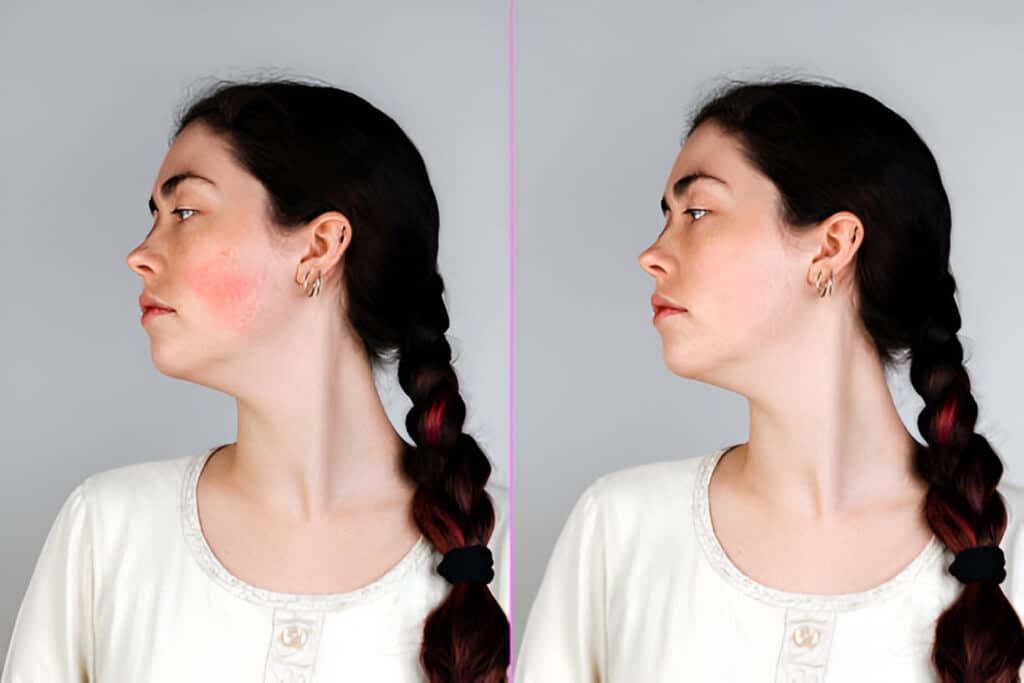Studies on the link between gut health and skin issues have gained a lot of attention in recent years. While many of us focus on external treatments and skincare routines to improve our skin, what if the key to glowing, healthy skin is inside? Research on the gut-skin axis—the connection between gut and skin health shows that what happens in your digestive system can have a big impact on your skin’s appearance. This guide will explore the changes in your skin before and after a gut health diet, and explain how improving gut health may help with skin issues like acne and eczema.
1. Understanding the Gut-skin Relationship
First one has to understand the link between the gut and the skin before exploring the details of what occurs to your skin before and after a gut health diet. One of the several ways the gut and skin are linked is the microbiome, that is, the trillions of bacteria and microorganisms living inside your digestive tract. Apart from other things, these microorganisms define general health, digestion, and immunity.
Usually brought on by a poor diet, stress, or another event, an unbalanced gut microbiome can lead to dysbiosis, or an imbalance of gut bacteria, and inflammation. These problems can manifest themselves as several skin disorders. Conversely, a good gut flora promotes appropriate inflammation and helps with the treatment of skin diseases.
Important influence of gut health on skin: inflammation Often causing inflammation, bad gut health aggravates skin conditions including acne, rosacea, and eczema.
Your gut carries most of your immune system. Good gut health supports a strong immune response and helps prevent inflammation and skin infections as well.
Good skin depends on essential minerals and vitamins including omega-3 fatty acids, vitamins A, C, and D—that the body absorbs depend on a healthy gut.
Often referred to as “leaky gut,” this condition compromises gut integrity allowing toxins to enter the bloodstream. These toxins can aggravate skin flare-ups, redness, and itching.
2. How Does Your Skin Change Under a Gut Health Diet?
Before starting a gut health diet, many people may already have range of skin problems resulting from inadequate gut health. Your skin speaks to the state of your digestive tract. Often a clue of digestive problems is skin flare-ups.
One of the most often occurring skin conditions connected to gut health is acne. Bad gut health can cause inflammation that aggravates blocked pores and raises the sebum, skin oil production level. Here are homes for the germs causing acne.
Common links between conditions including psoriasis and eczema are inflammation and an overactive immune system brought on by gut dysbiosis.
Renowned for redness and obviously visible blood vessels, rosacea has been linked to digestive problems. Rosacea flare-ups may start with an imbalance in the gut flora.
Low in fiber and high in processed foods can compromise the body’s capacity to absorb vitamins and antioxidants, hence resulting in dry, dead skin.
Underlying the skin, gut health and inflammation can affect blood vessels, which can cause puffiness and dark circles around the eyes.
Before starting a gut health diet, these skin issues could appear to be chronic and difficult to treat. Temporary relief from topical treatments helps some people; nevertheless, the fundamental problem remains. Starting to take care of gut health will only help you to expect noticeable, long-lasting skin improvements.
3. How might a diet high in gut-health support better skin?
How could gut and skin conditions be simultaneously improved? Usually speaking, a gut health diet aims to balance the gut flora, support the digestive system, and reduce inflammation. Restoring their gut flora helps many people clearly improve their skin condition.
What kind of diet for gut health looks like?

A gut health diet stresses whole foods, fiber, good fats, and fermenting foods if one seeks a balanced microbiome. Here are basic components of a diet designed to support gut health:
Foods high in fiber—fruits, vegetables, whole grains, legumes—help to feed good gut flora and support a healthy digestive system.
Among fermentable foods high in probiotics that improve gut flora are yogurt, kefir, sauerkraut, kimchi, and kombucha.
Found in walnuts, flaxseeds, and fatty fish, omega-3 fatty acids are good fats that hydrate and reduce inflammation.
Berries, leafy greens, and nuts all abound in antioxidants; they fight free radicals and protect the skin from damage.
Foods high in prebiotics, that is, foods like garlic, onions, bananas, and asparagus—that feed the good bacteria in your stomach.
While a gut health diet aims to over time improve digestive health and skin appearance, it seeks to minimize symptoms of poor gut health.
4. How Might a Diet Designed for Gut Health Affect Your Skin?
A diet good for your gut could cause slow changes in your skin. Your particular degree of skin problems and gut health will decide how long these changes take; although many find good results in few weeks to months.
4.1. Lower Acne and Blemish Count
As your gut flora settles, your body starts to become less inflammatory. Less oil generation and less blocked pores resulting from this help by themselves reduce the risk of acne. Less red, inflammatory lesions brought on by lower inflammation yields clearer skin.
4.2. Improved, more clear skin

Enhanced skin is one of the first obvious, brilliant advantages of starting a gut health diet. A good diet will enable your body to absorb more nutrients, which will supply the vitamins and minerals your skin need to heal itself and look healthy. For instance, increasing consumption of foods high in vitamin A—sweet potatoes and carrots—may help to enhance skin tone and texture.
4.3. Minimal Flakiness and Dryness
Good nutrient absorption made possible by a healthy gut helps skin hydration. Many proponents of gut health say they feel less dry and flaky. Cutting inflammatory foods and consuming foods heavy in omega-3 also helps to produce more hydrated, smoother skin.
4.4. Reducing Rosacea and Eczema
Maintaining gut health will enable those with rosacea or eczema have less flare-ups. Studies reveal that people with these diseases sometimes have an imbalance of gut bacteria; hence, restoring gut health could help them to experience less irritability and less flare-ups.
4.5. Less dimpled puffiness and dark circles
When the gut is in good running order, the body can more effectively eliminate toxins and waste. Along with the puffiness and bloating around the eyes, this can help to minimize the look of dark circles brought on by inflammation and inadequate circulation.
5. Last Notes: Does your skin would benefit from a Gut Health Diet?
If you have skin problems including dryness, eczema, or acne, a gut-healthy diet could be the missing element. Emphasizing gut healing, reduces inflammation, and boosts nutrient absorption will help you to get long-lasting, glowing skin.
Remember also that nobody will benefit instantly from a gut-healthy diet. One must be relentless; the outcomes could take some time. Other factors also significantly affect skin condition: sleep, stress management, and skincare products.
If you want to improve with your skin using a gut health diet—especially if you already have health problems—always a great idea is to speak with a healthcare professional. They can help you choose foods and supplements to keep gut and skin integrity intact.
Conclusion
Clearer, brighter, more hydrated skin comes from better gut health, thus the skin both before and after a gut health diet will clearly show differences. Stressing whole, nutrient-dense foods, reduced inflammation, and support of your microbiome will help you address many skin issues from their underlying causes. If you want perfect, healthy skin, pay attention to your gut.



